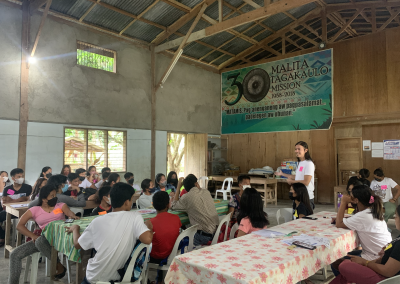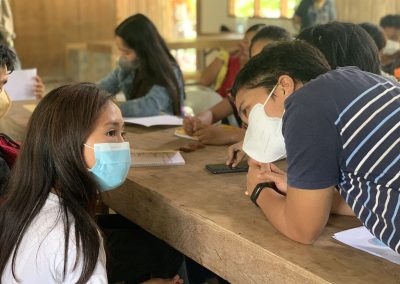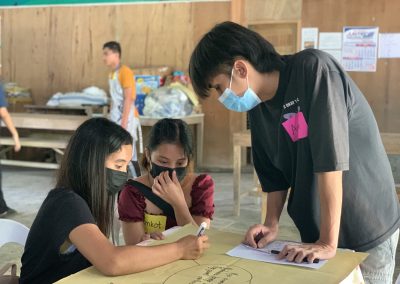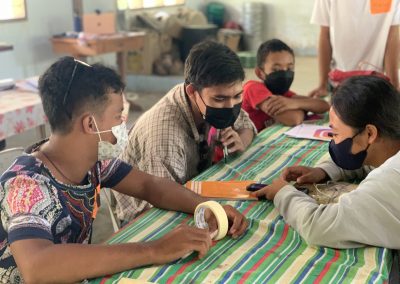MALITA, DAVAO OCCIDENTAL–Undergraduate students from the Ateneo de Davao University’s Department of Anthropology conducted a digital skills training for the Tagakolu youth of Sitio Matamis, Malita, Davao Occidental on Saturday, October 22.
Indigiknow was spearheaded by fourth-year AB Anthropology student Gwyneth Marie Vasquez as part of her “Ignatian Advocacy” for the Seniors’ Integration Program (SIP), an exit course designed for graduating undergraduate students at AdDU that synthesizes their overall academic, social, and spiritual formation.
Having spent two months of fieldwork among the Tagakolu, Vasquez said Indigiknow was “a way of paying it forward to and doing something concrete for” the community that has helped her complete her thesis.
It was organized in partnership with the Mindanawon Anthropological Society of the Ateneo (MASA), the academic club of anthropology students and enthusiasts in the University, and the Malita Tagakaulo Mission (MATAMIS), a Catholic Mission that runs the Tagakolu ministry in the uplands of Malita.
“Indigiknow” was designed as a student-led capacity-building session that sought to respond to issues arising from the recent and high uptake in Information and Communication Technologies (ICTs) among the Tagakolu youth.
It was attended by 27 participants aged 13 to 19 from different Tagakolu sitios and barangays. Among the important discussion points were the key characteristics of social media and the role of algorithms in shaping social media use.
It also highlighted the participants’ voices and experiences through group discussions and activities, which were facilitated by the MASA members. The training culminated in the participants indicating for themselves different ways to become more critical in their social media usage.
“Unta daghan pa ang inyong matabangan nga kauban namo na batan-on kay nindot kaayo ni. Daghan kaayo ko’g natun-an labina about sa pag gamit sa social media, murag naka realize ko nga na sobrahan ko sa pag gamit sa social media. Dako nga tabang kini sa amua,” (I hope you will be able to help more young people like us because this training is really nice. I learned a lot about using social media, and I realized that I must have been overusing it. This is a really big help.) Angelica Gualna, one of the participants, told the organizers.
“Indigiknow” is a portmanteau of “indigenous,” “digital,” and “know” that Vasquez conceptualized with a group of young leaders at the Ramon Magsaysay Award Foundation’s NextGen Leadership Program. Later, it was granted funding under the Young Southeast Asian Leaders Initiative Seed Grant and implemented with her peers at the Department of Anthropology.
When asked about what sets Indigiknow apart from other similar programs, the organizers said its strength lies in its research-based intervention and the integration of anthropological perspectives and methods.
The Tagakolu are one of the indigenous peoples in Mindanao who recently gained access to the internet amidst the Covid-19 pandemic, through profit-oriented piso wifi machines and even AdDU’s ACCESS Mindanao program.
In her thesis, Vasquez showed that physical access to ICTs was insufficient to bridge the digital divide among the Tagakolu, if they do not possess adequate digital skills to use them. She also found that young people were often the most avid ICT users, but also one of the most vulnerable to online threats, hence Indigiknow’s rationale.
“There is often an assumption that ‘connecting’ remote peoples to the rest of the world via the internet already solves many of their problems. In reality, true internet democracy should mean not only providing physical access to ICTs but also, equipping people with adequate digital skills to use them,” the organizers wrote.
“This is the message that Indigiknow would like to communicate to the world. And addressing this issue is its mission which begins in Mindanao.”




